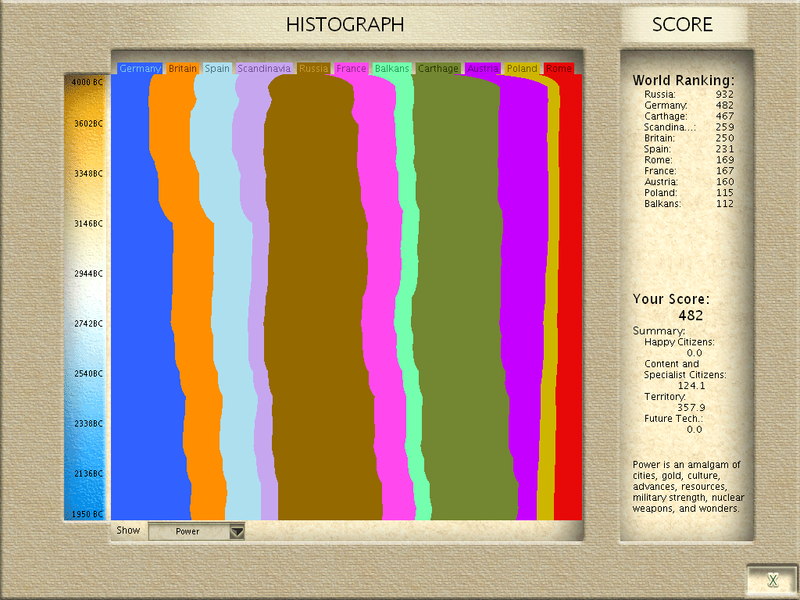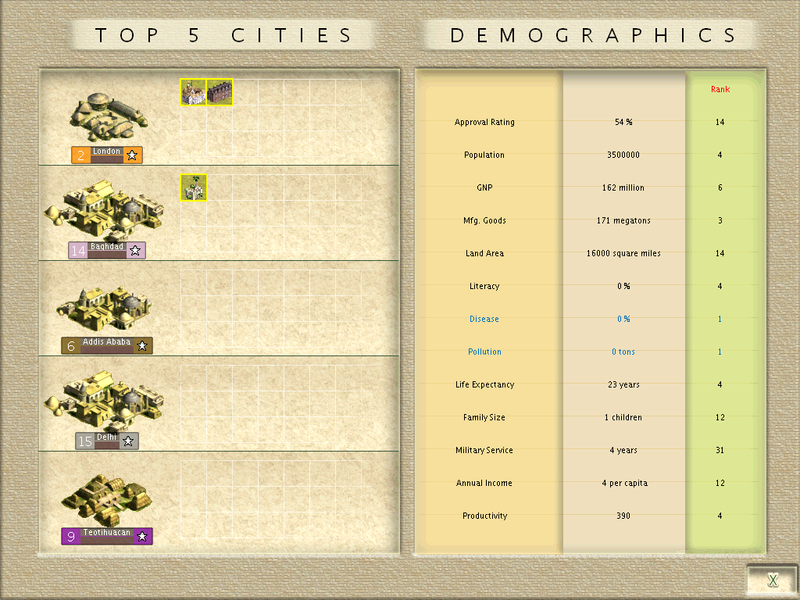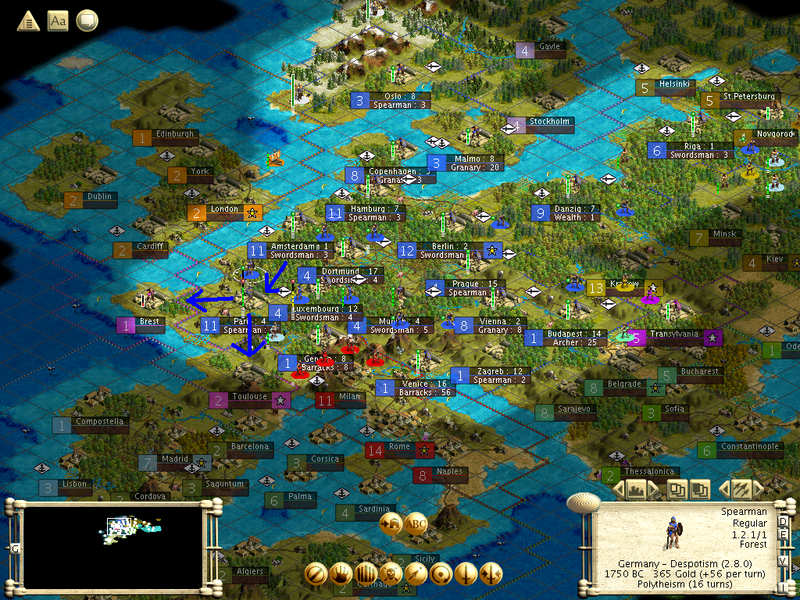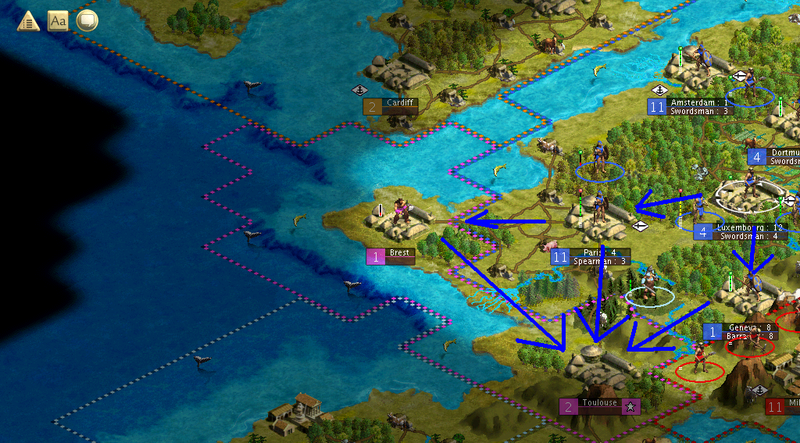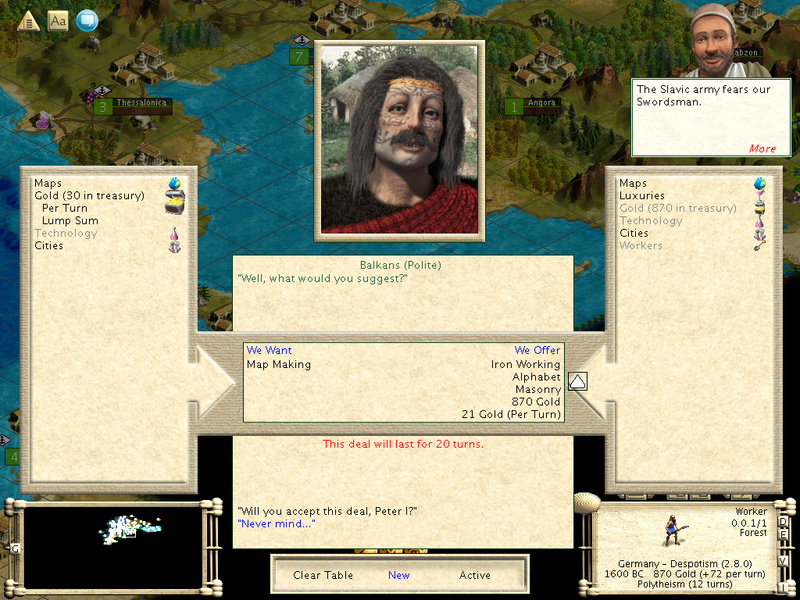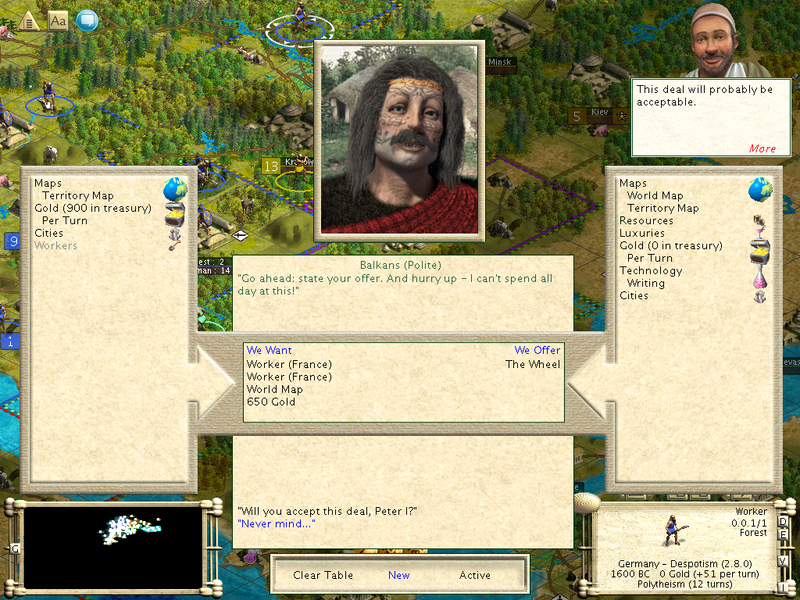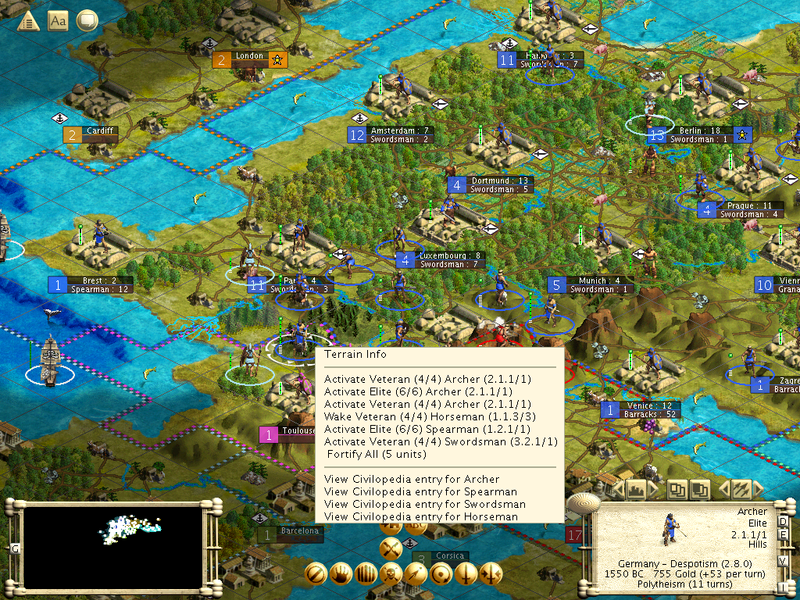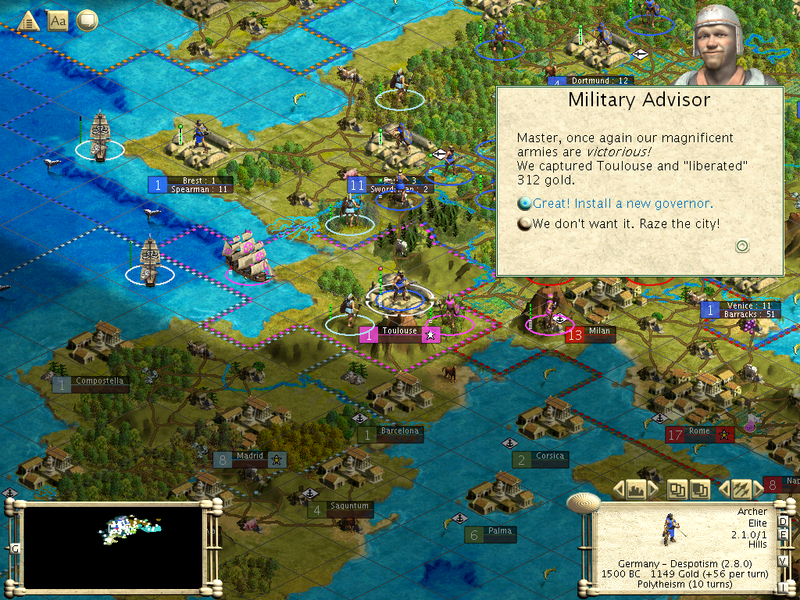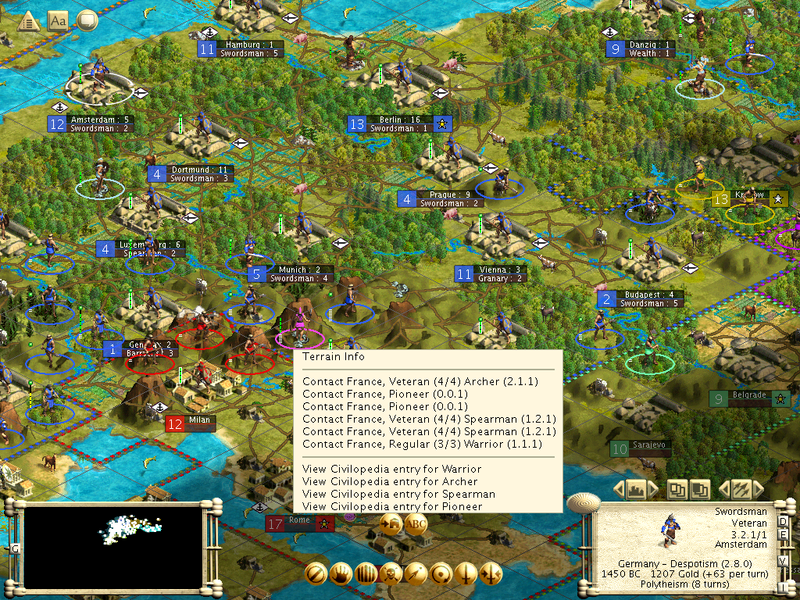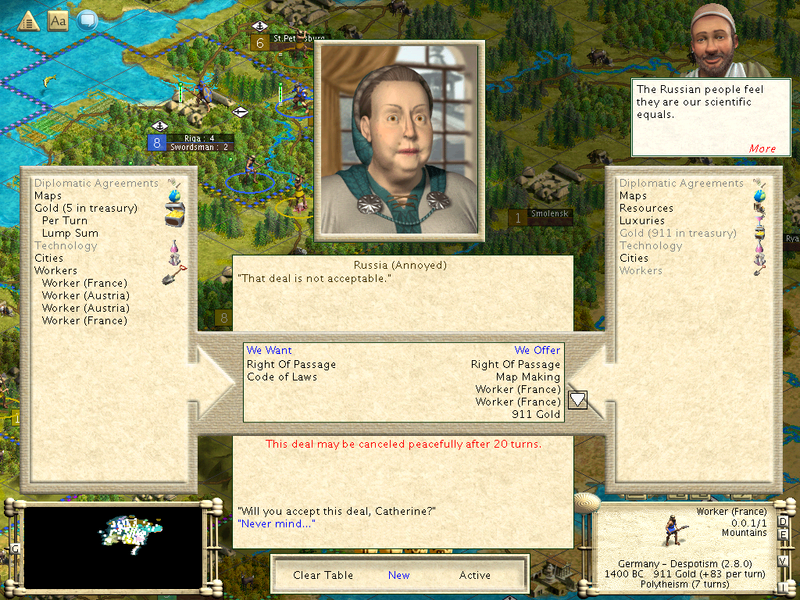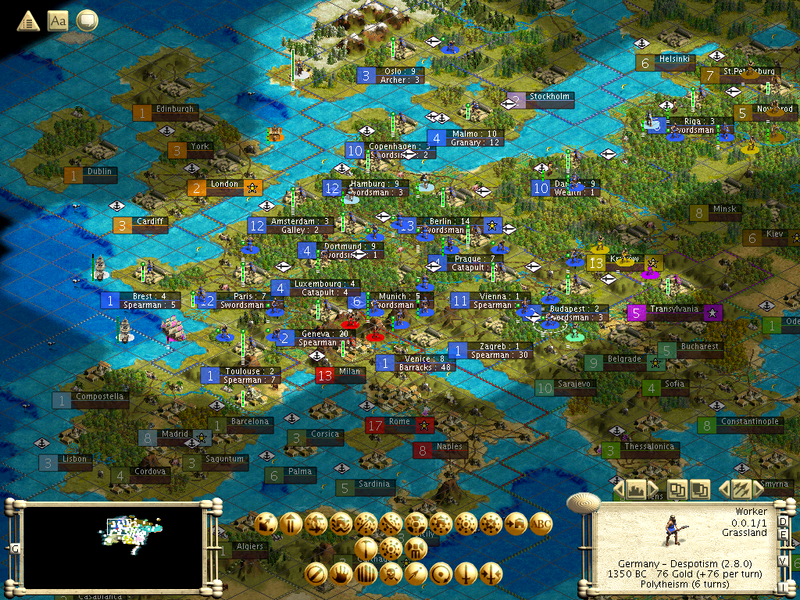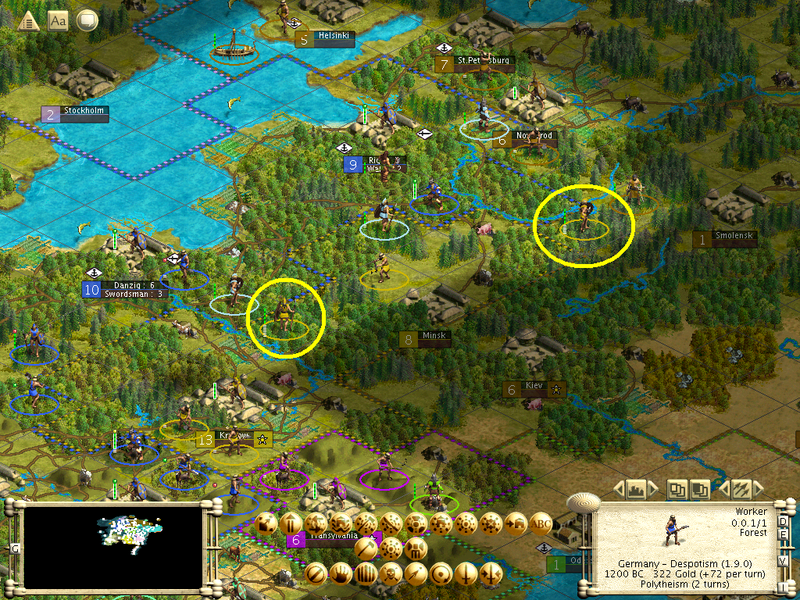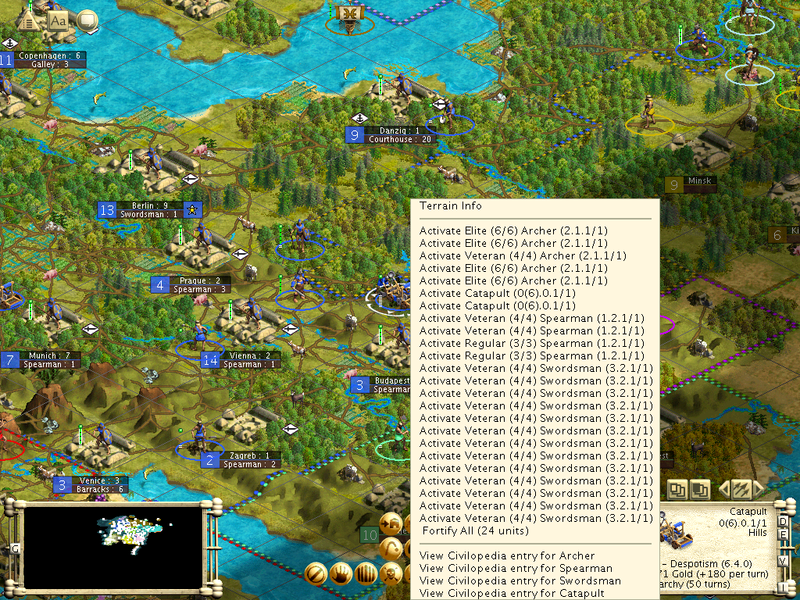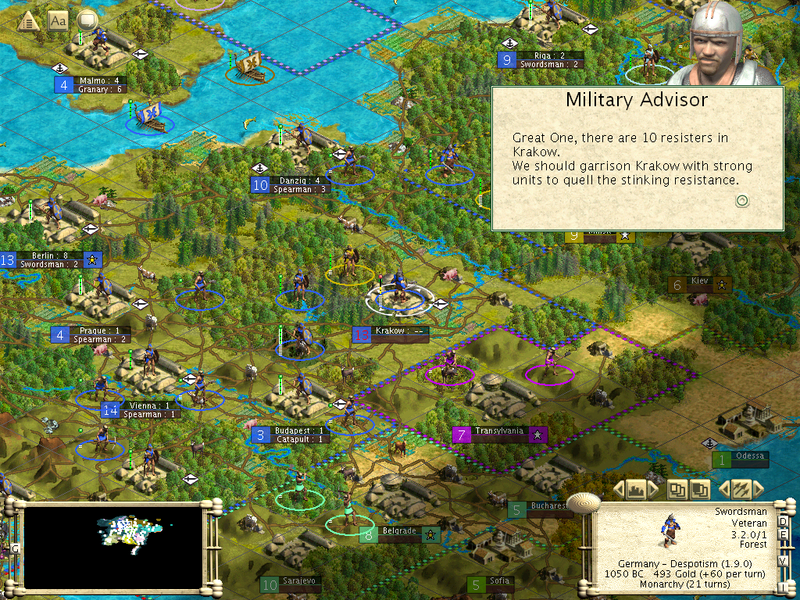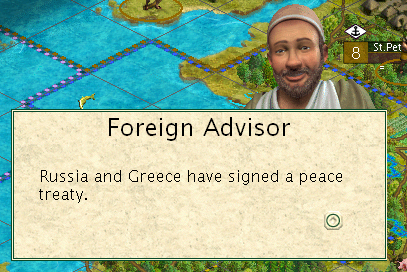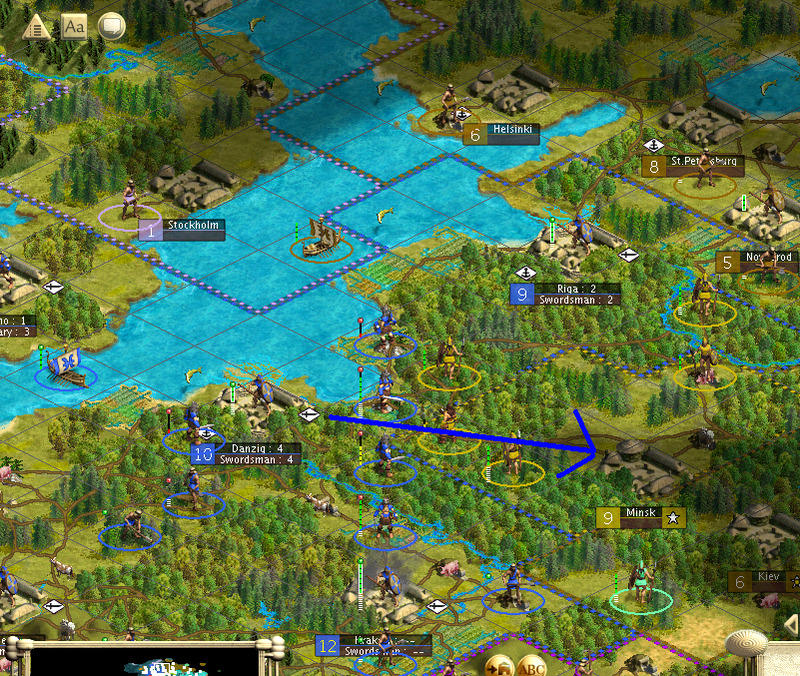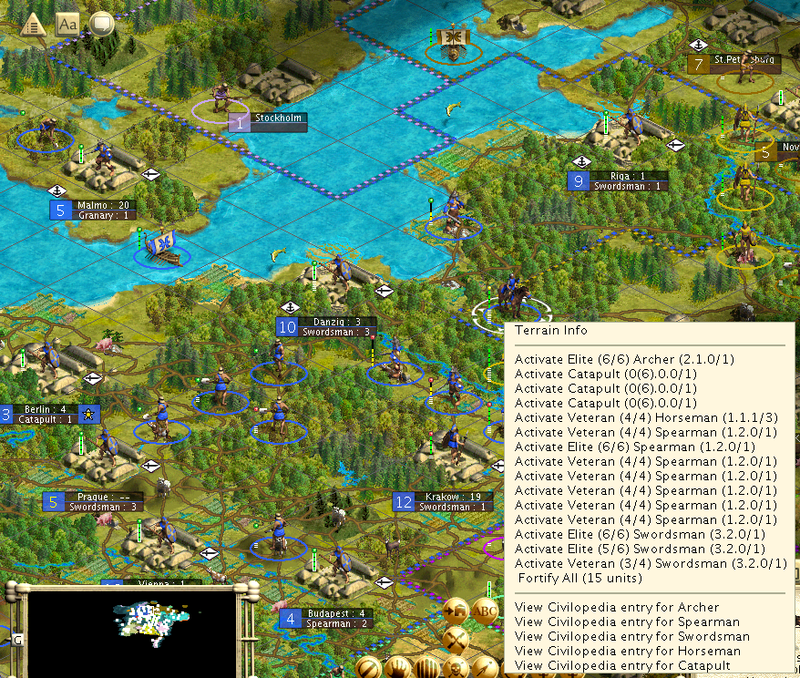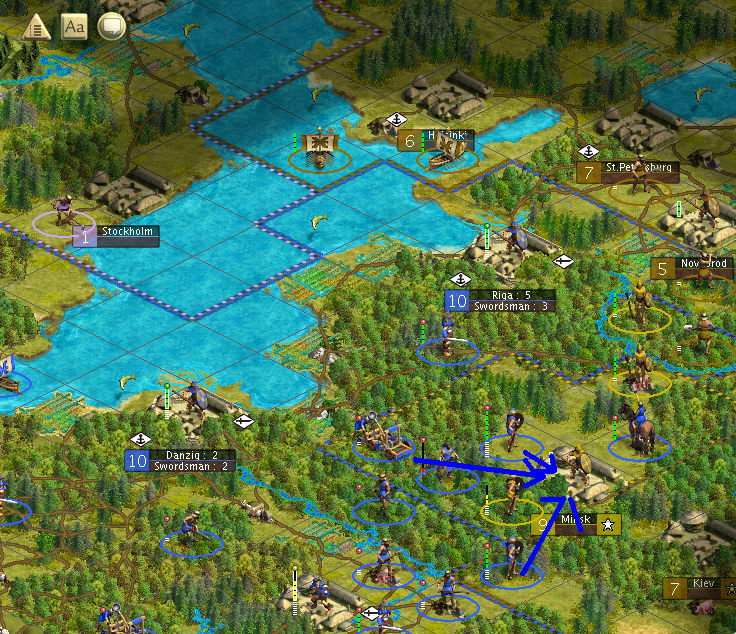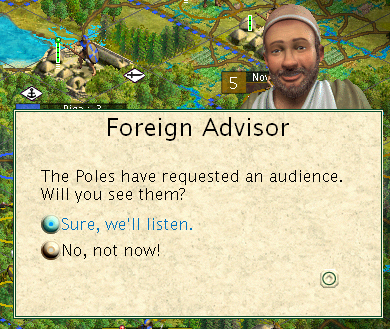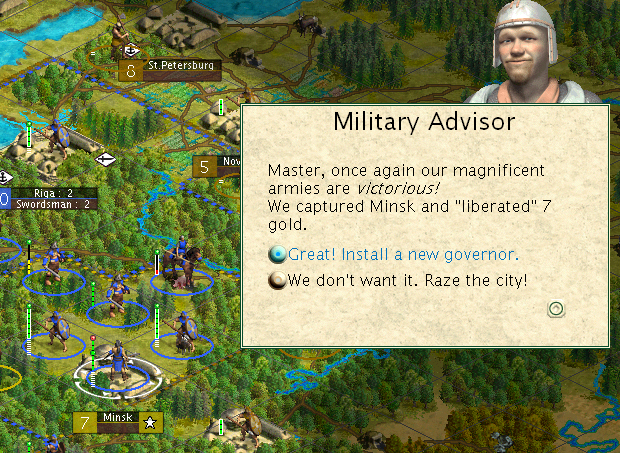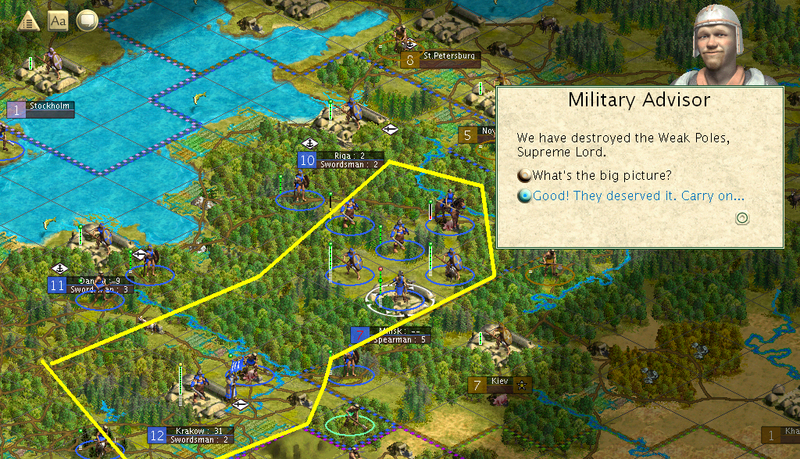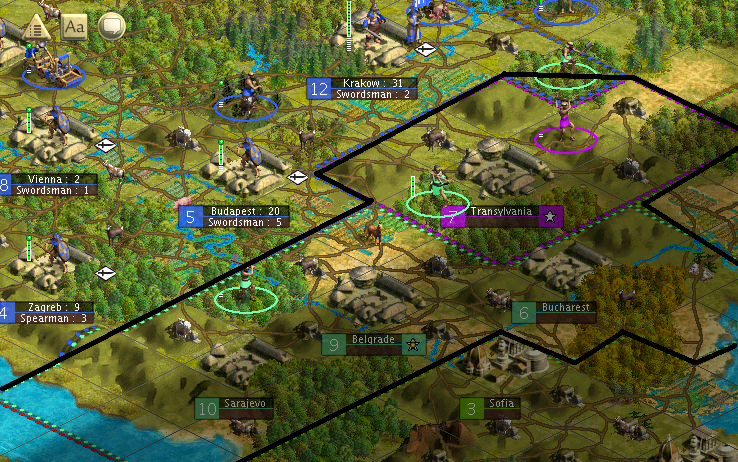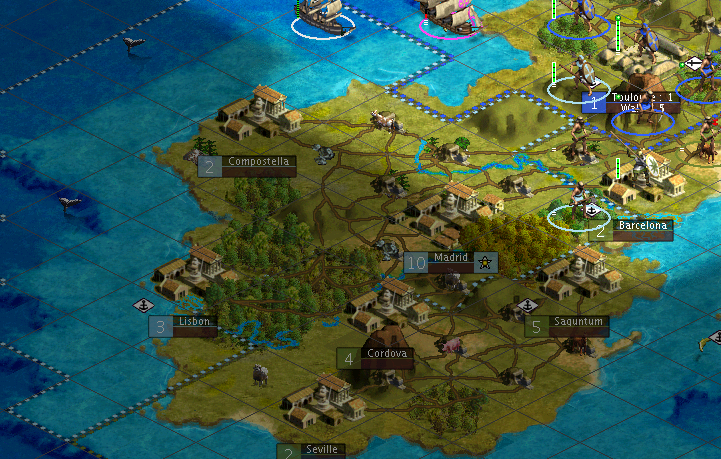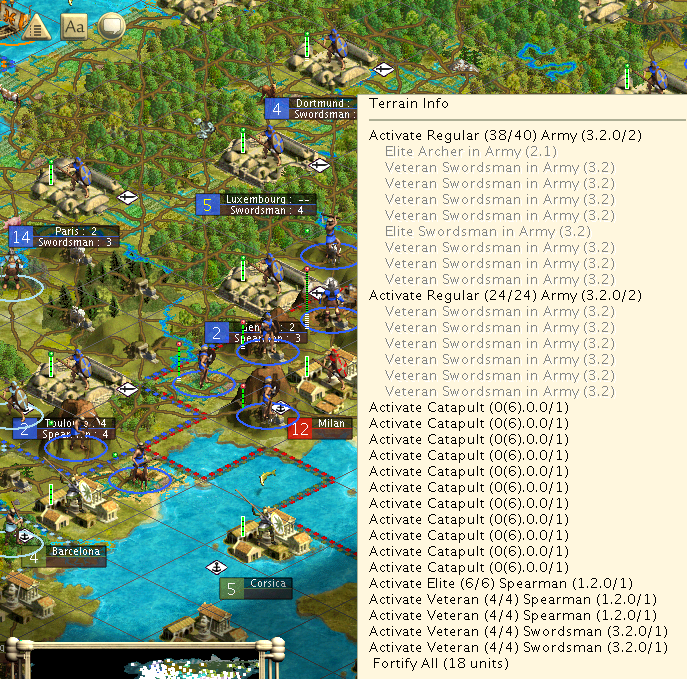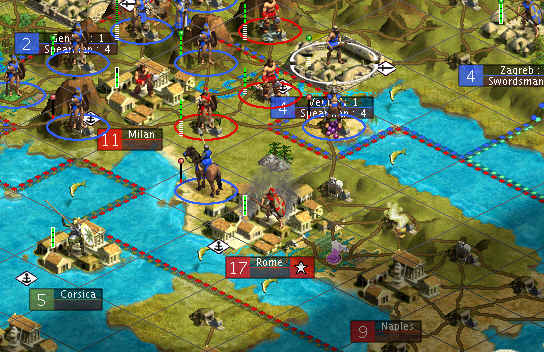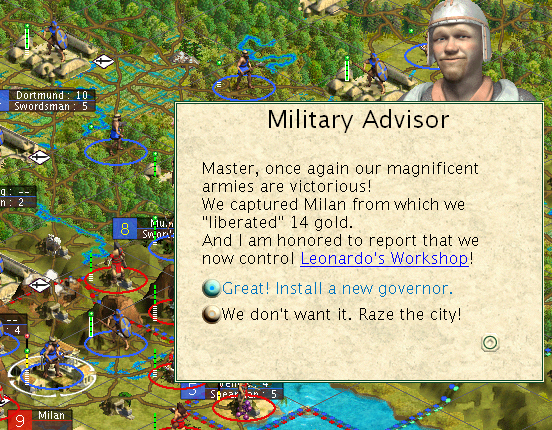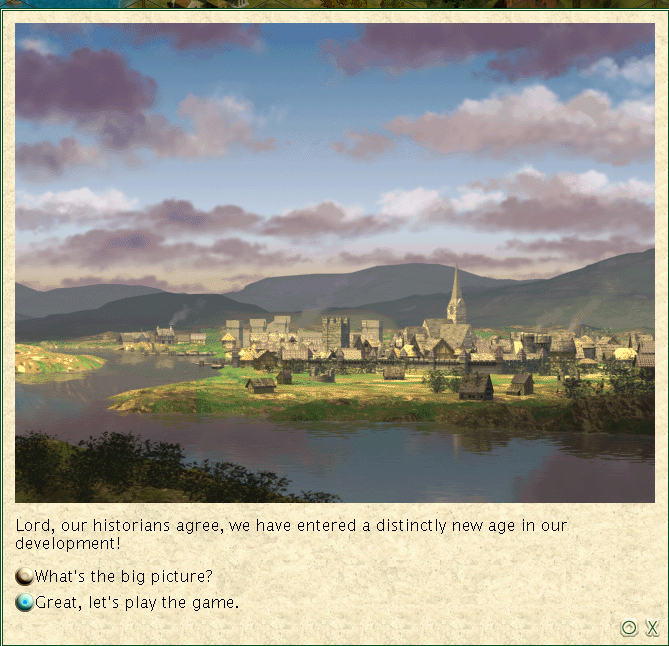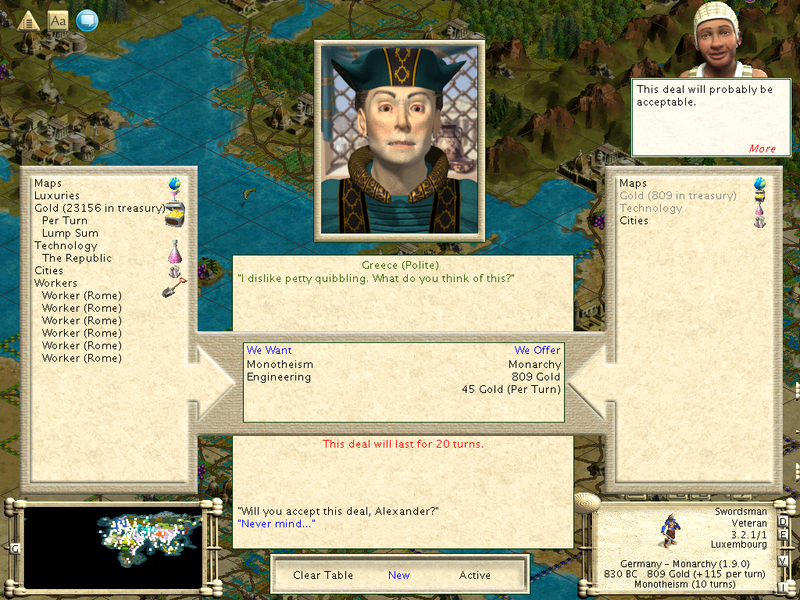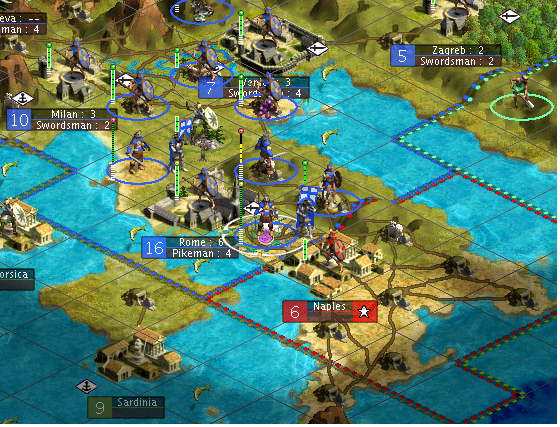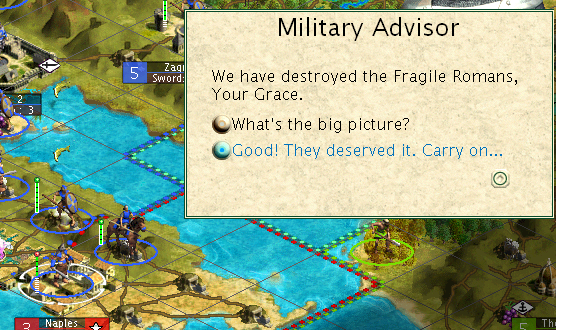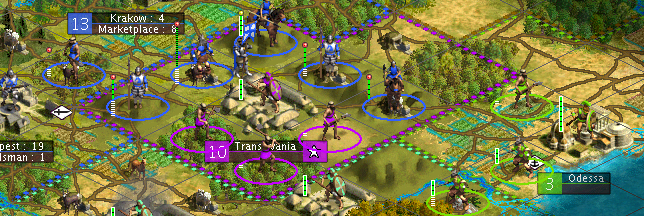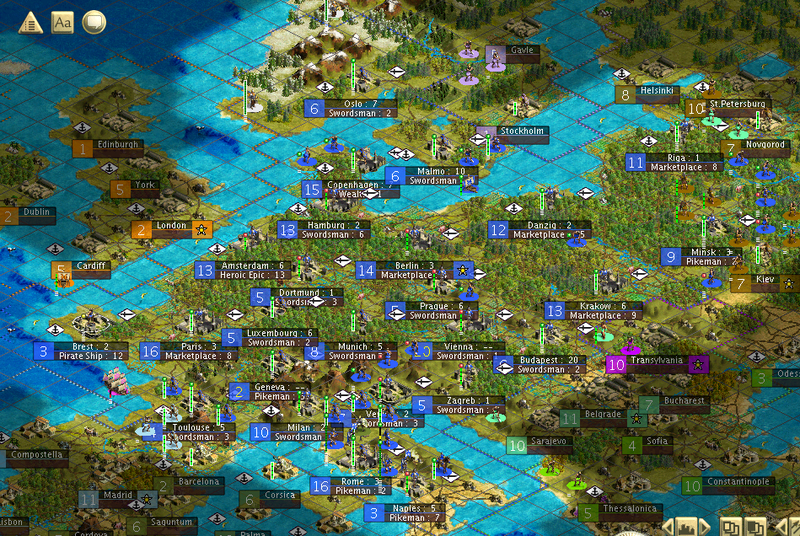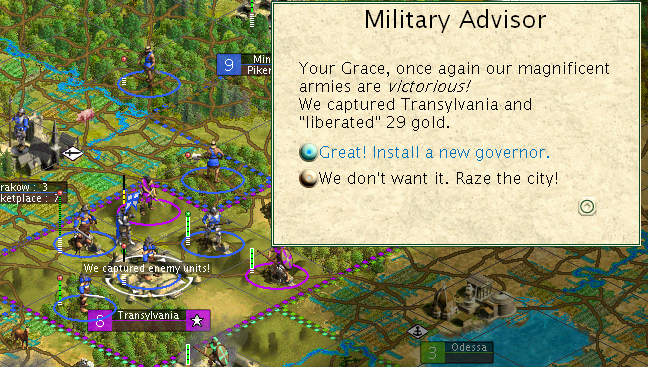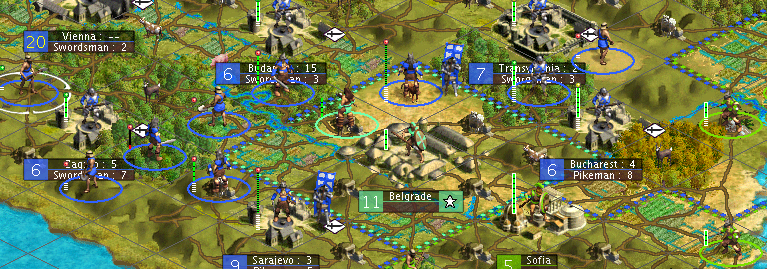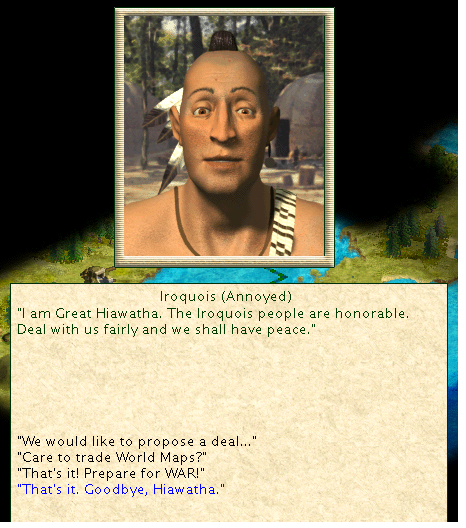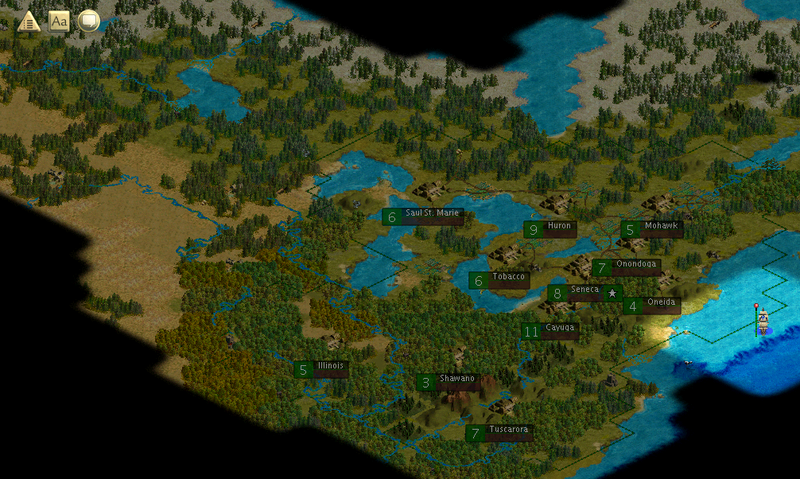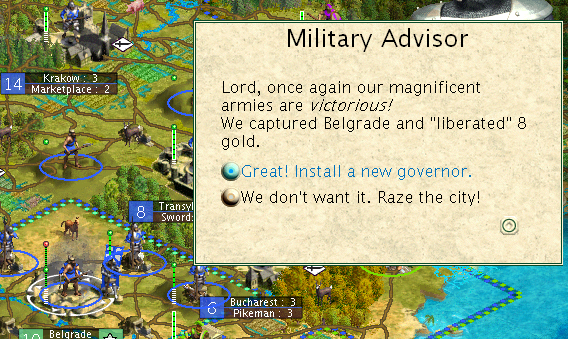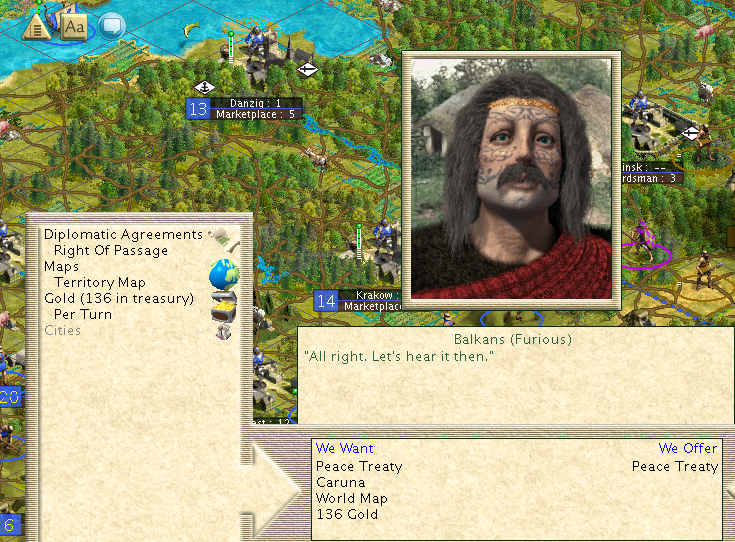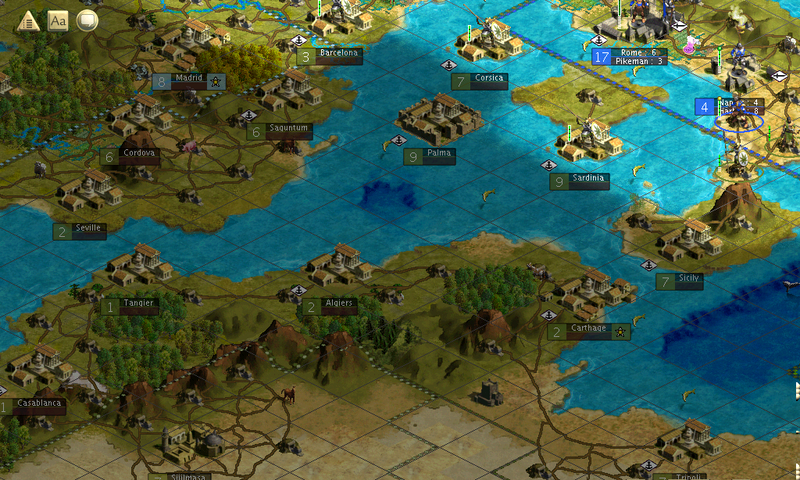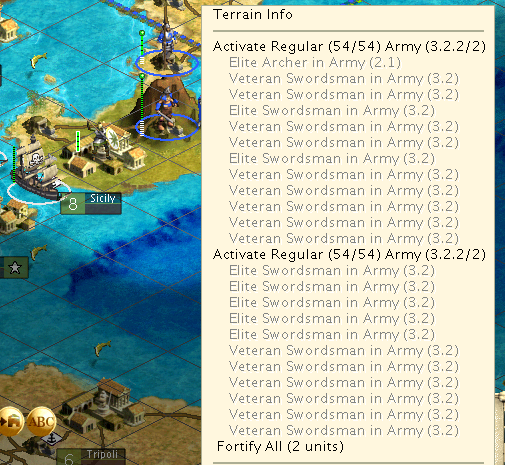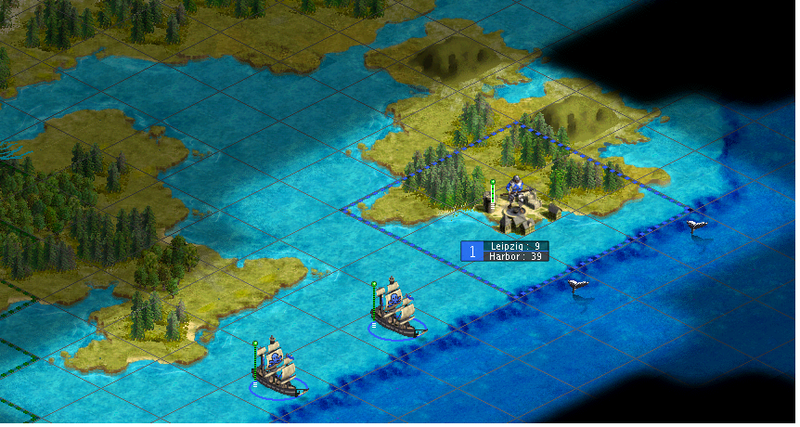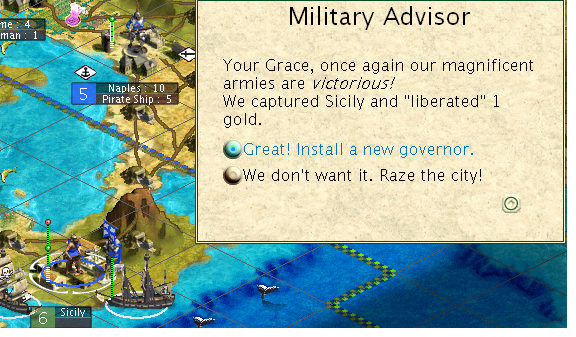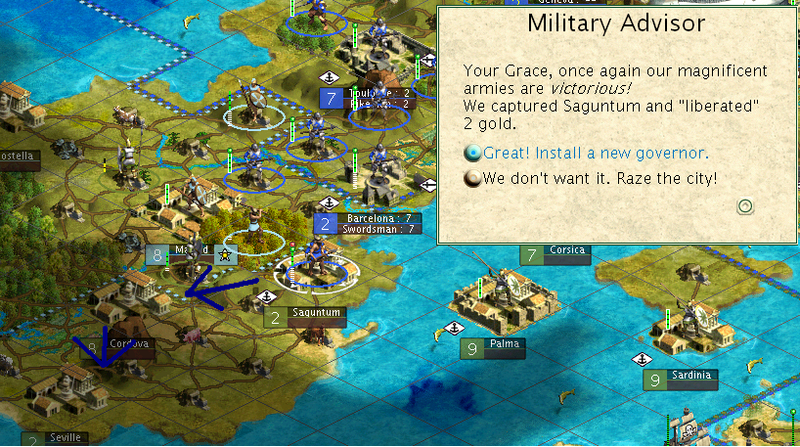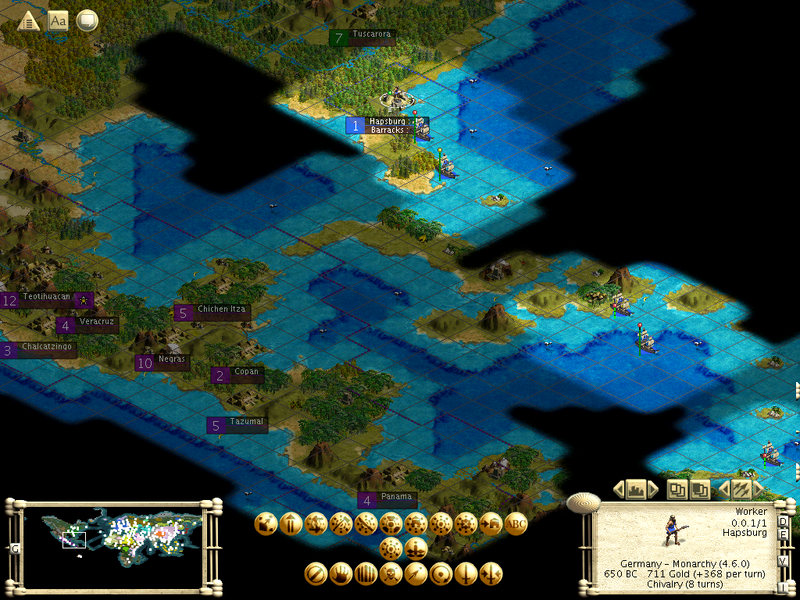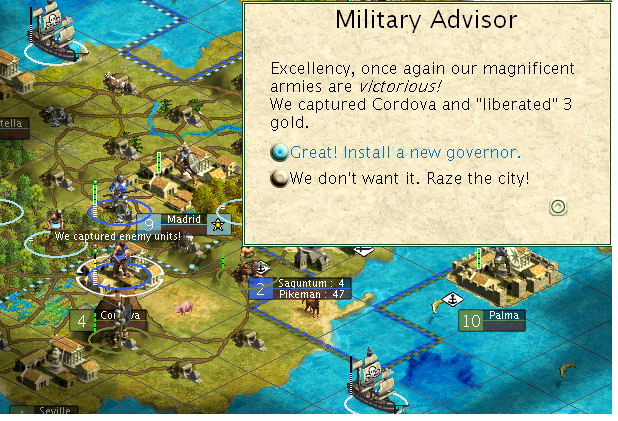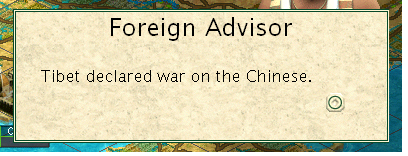Tani Coyote
Son of Huehuecoyotl
- Joined
- May 28, 2007
- Messages
- 15,191
Alright, this is my THIRD story...this time, there will be NO other games allowed until I get this done...the last game, my Persian Empire...fell out because I was a moron, played as the Persians on a random map, and accidentally overwrote the save file. x_x
So, here is the story of the German Reich!
---
Qualities : This is made on a slightly modified version of Teturkhan's Test of Time. Some cities have been added, many cities have changed owners, the Celts have become the Balkans/South Slavs while the Hungarians have been turned into the Austrian Empire.
More roads have been added based on major trade routes, and the slave trade is emulated by the fact that most pre-Industrial units can enslave and create a worker, which in turn can be sold abroad for money.
Asian Pirate Ships and Pirate Ships can be build by the major powers, provided they have the blue Buddha Relics and Coptic Cross respectively. Germany, France, Spain and Britain, thanks to their real naval races, also have the ability to acquire Asian Pirate ships - they just have to convince China to give up a Buddha Relic. ;3
---
The First and Last Reich - 4000 - 3000 BC
As a child, I remember how the German empire straddled the globe. I was too young of course to really care for the most part, but it was still interesting. Becoming a historian, I dug very deep into our legacy. I went as far back as 4000 BC, far before the German state existed.
Those were days of grave uncertainty. You were lucky to see your grandchildren be born, or see your children reach maturity. You never knew when Barbarian hordes would come in and sack your city, steal your women and massacre most of those you knew and cared for. But most of all, it was an age of strong localism, there were no truely great empires.
In Germany's case, we started off as a medium-sized people. Over the generations, we had spread out across our home continent of Europe, stretching from Amsterdam in the West to Riga in the East, far along the Baltic coast. We were far flung, but rivers, forests, and mileage greatly crippled our potential to be an empire. We had little infrastructure, and the determined attacker would devour our people with little difficulty.
Within a few hundred years, some towns and villages gained an edge over others. In the western part of the empire, near the Rhine, Amsterdam became the most powerful village, trumping Dortmund and building the fortress of Luxembourg. In Central Germany, Berlin founded many colonies, such as Hamburg. And far to the east, Riga and Danzig each consolidated their rule over the nearby lands, forming 4 core regions of the German people.
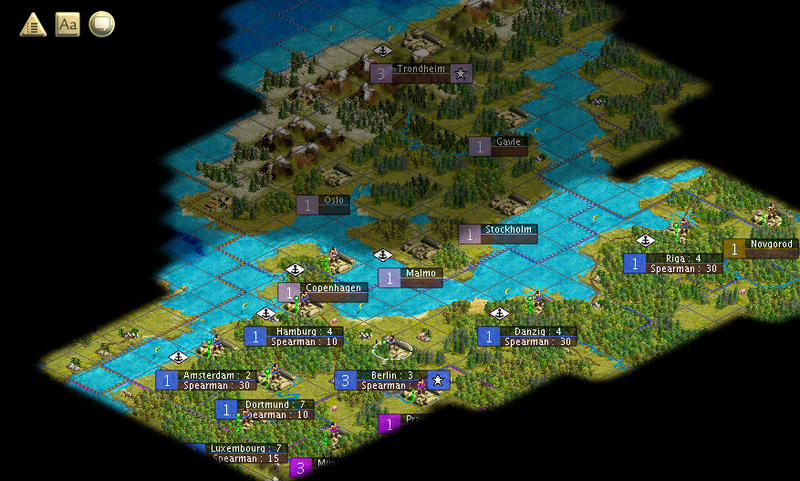
Within years, we also had met other major groupings of people. To the north were the Vikings, who modern biologists trace our origin to. To the east were the Russians, a vast horde of people with considerable power on the Eurasian landmass. Finally, to the south were the Austrians, who also had considerable power. The German people were rather small in terms of landmass compared to these other giants, but enough pressure would bring Germany the prosperity and unity it desired.
This leadership came from the city of Berlin, in the center of the German peoples. Fielding a vast military machine that kept central Germany tightly under it's rule, Berlin established relations with the Vikings and acquired details of their landmass via maps, at the cost of depleting much of it's treasury. Berlin also met the Austrians at the city of Prague, and even tried to send diplomats to Riga, Danzig and the cities of Russia.
All across the world, the dominant political system was one of tight social and political controls, regulated not by a Constitution or religion, but by military might. The main way of increasing stability and hurrying projects was by forcing criminals and peasants to work on them to the moment they died. A cult of personality was built around the center of the military's power, known as the Despot. Despotism reigned supreme across all continents and cultures. Germany was no exception.
Berlin paved it's way to leadership - literally. Large groups of workers were sent to build routes through the forests and towards Danzig and Riga, and the small landlocked nation south of it - Poland. By connecting all major cities, Berlin hoped to facilitate trade and a sense of nationalism, or at least make it easier for their armies to crush their opponents and declare themselves rulers of Germany.
In a few more years, we noticed the movements of foreigners who came to be known as the French and British. We saw the British send a large expedition of settlers on a voyage out of their island home...only to see the fleet devestated by a large fleet of Pirates. A sad day for Britain - a GREAT day for the Berliners.
We acquired maps of Britain and France, Germany's world slowly taking shape. However, it did not excuse the fact that Germany remained rather behind in technology. We were too busy fighting amongst ourselves, while Britain and France had mastered the arts of pottery, masonry, the alphabet, among other things.
After some completion of the road, the Berliners became all the more aggressive. They saw Scandinavia as an imperialistic power that would conquer Germany if given permission. As such, they planned to annex Copenhagen and kick them off mainland Europe. This would be facilitated by building a road east of the Elbe river near Berlin, half of our public works being devoted to this military road, the other half continuing to build paths towards Danzig - which was already connected to Riga, thanks to a convenient trade route known as the Amber Road.
Germano - Viking War
The war against Scandinavia began in 3450 BC. It was a quick battle, and Copenhagen was taken by our archers with minimal casualties. The objective was accomplished, and the Berlin government would wait out the war until it could acquire favorable terms. Several Scandinavians were also acquired as slaves, these were sent back to Berlin and sold.
The 3400's BC was a time of prosperity for Berlin and all Germany. The Berliners now controlled Copenhagen and had sealed off their northern front, they had also finished their road to Danzig, and they met the Poles of the East for the first time. Only 600 years into existence, Germany had become more centralised, all that was left was for Berlin to 'convince' the rest of the German states to become 'allies'.
The Berliners did this by advancing themselves far beyond other countries. In exchange for giving up it's Warrior Code of honor and knowledge of the arts of war, Britain yielded the arts of pottery, ceremonial burial, and how to create an alphabet. Berlin also heavily bankrupted itself with 2/3 of it's annual GNP being given to Britain for these technologies, and all money on hand was handed over as well. But to the Berliners, conquest of the Scandinavians and the rest of Germany would outweight the costs of doing it.
Berlin - Vienna Competition
Berlin's aggression continued in 3250 BC, with the invasion of the city of Prague on the outskirts of Austria. Berlin felt that all the regions of Germany should be united under it's hegemony, which the city of Vienna contested, as it dominated Austria. Thus, war broke out, with most of Germany coming to aid Berlin.
Treaty of Oslo - Ends the Scandinavian - Berliner War
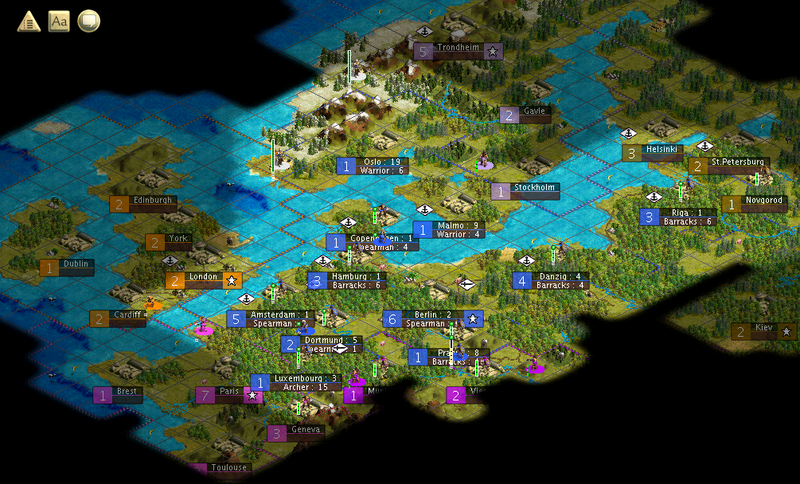
3200 BC saw further expansion of Berlin's empire. The Scandinavians, tired and war weary, chose to sign a peace treaty and surrender. The treaty of Oslo destroyed Scandinavia in practice. What little was left of their economy was sent to Berlin, and their cities of Malmo and Oslo ceded to the Berlin Despotate. Berlin was on the rise, now controlling much of the Baltic and North Seas.
The fall of Prague was a considerable victory, but two cities were wanted by the Berliners - Vienna and Munich, both strongly German in ethnicity, but refusing to admit Berlin's dominance.
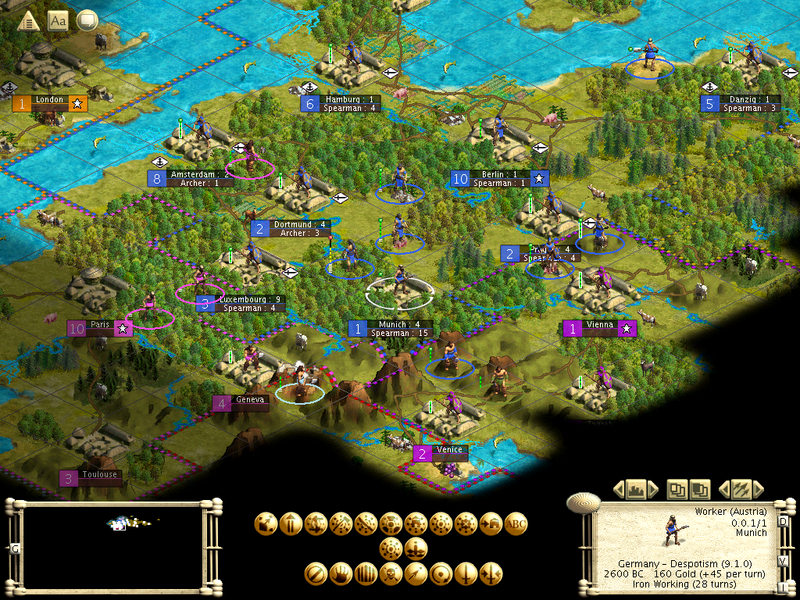
It took several centuries, but constant skirmishes between Berlin and Vienna caused the fall of Munich into Berliner hands. The other German states had all had times of troubles, crippling their economies as they tried to keep up with Berlin in power, but to no avail. The Despot of Berlin, Heinrich von Elbe, once a mere peasant, stated that the war would never reach a true, infinite end until Vienna had been captured. But in reality, Heinrich was focusing on a potential asset that Austria held - Venice. With it's naval capabilities, Venice would be an excellent base with which to further expansion in the south, across whole seas and oceans.
Relations were opened with Isabella of Castile in the year 2600 BC. Isabella was a strong woman, and with her husband Ferdinand of Aragon, they controlled the Iberian peninsula, albeit with an incredible rivalry and disadvantage towards the Carthaginian maritime empire. Isabella sold the Berliners a map at a great price, revealing huge chunks of land to the south, on a continent called 'Africa'.
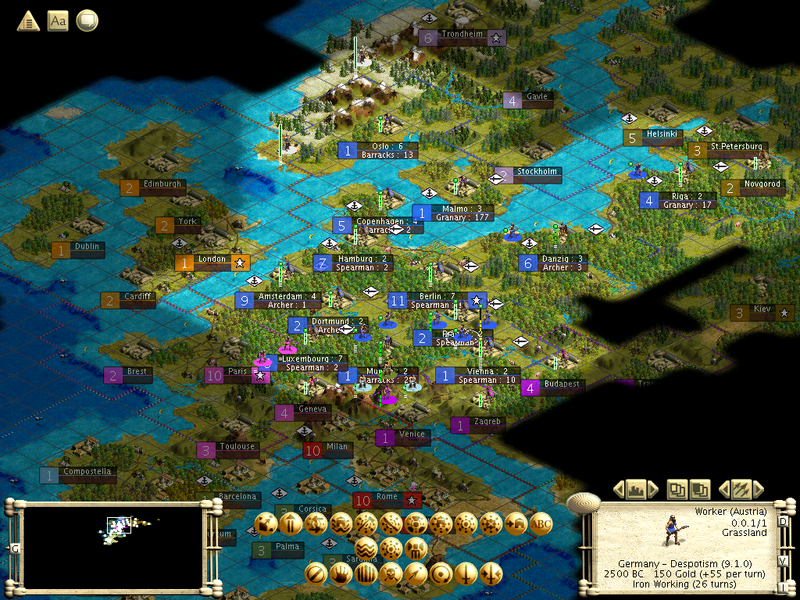
Finally, in the year 2500 BC, the Berliners managed to destroy the Vienna garrison once and for all. The best archers were in such larger numbers not even Vienna's formiddable defenses could keep them back for long. Many slaves were captured with the city, 2/3 of whom were actually German soldiers or their descendants captured during the onslaughts of the past hundreds of years.
---
Emperor Franz Ferdinand fled from his capital of Vienna with amazing speed on his horses, as did his best men and family. They were fleeing East, towards the city of Budapest, which would be the military capital, while the Emperor himself would camp out in Transylvania, which had a large population yet was relatively remote.
"Those barbarians...they are so backwards! How in the world did they capture 2 more cities from us?! Prague fell because we weren't expecting such an attack...but now Munich and VIENNA?!" the emperor was concerned. The massive 'protection racket' that Vienna and Austria had held on Central Europe was collapsing in the face of a few thousand troops from Berlin and it's allies. In fact, every spec of German ethnicity besides the emperor and his loyalists was now within Berliner hands.
"It seems a lack of formal training outside Vienna weakened us sir. Every German city is under some sort of full protection from Berlin, which is supplemented through a military base in every city. That also serves to keep the city loyal. Because of this...their soldiers have been vastly superior..." one of the Emperor's military advisors replied.
"Damn. Either way, we must reach Budapest by the end of the week. The Hungarians are expecting us, they're willing to work out some sort of deal to let us rule them directly. Apparently their current overlord is so corrupt and vicious that they'd rather let a foreigner take over."
The emperor was never to take his new throne. Not too far from the city, he and his caravan were ambushed by Budapest patriots. They opened fire with a hail of arrows, and within an hour most of the emperor's group was dead. Franz himself was assassinated by an arrow straight through the eye. The Austrian monarchy was gone, as most of his family was massacred as well or captured in Vienna. The empire would soon dissolve as Zagreb, Transylvania, Venice and Budapest heard the news.
Austrian Empire breaks down
Constant warfare was waged for the last few sections of the Austrian tributary empire. The many cities that had been under it's suzerainty fragmented, some asserting independance, others laying claim to the Crown of Vienna. Regardless, the Berlin - German coalition sought to annex these regions to provide 'security'. In reality, it was securing the route to Venice, the real prize in the war. Budapest was targeted because it was on the same side of the river as Vienna, thus not hindering movement. Once that was taken, it was planned to march on to Zagreb, then finally Venice. Transylvania, rural and not having much value, would be left alone.
---
The alarm bells all over Budapest rang at about 4 AM one cold morning in 2250 BC. Citizens rushed to the streets, eager to see what was occuring, being told to go see their new leader, "Emperor" Leopold III, who was Hungarian but had Germanised his name to add credibility to him being the successor of Franz Ferdinand.
"Citizens of Budapest, soldiers of Hungary, subjects of the Austrian Empire! Before us, only mere miles way, lie the armies of Berlin and it's usurper allies!"
The citizens suddenly talked amongst themselves, panic, worry and fear clearly mixed in with their comments.
"Be silent, my people! For you need not fear. We have adequate supplies, adequate weaponry, and good soldiers to protect us. You shall be armed yourselves. If we are to turn back the siege and eventually press on to reclaim the throne at Vienna, we must defeat these barbaric hordes, not just with our army, but with our spirit and our entire population! The outcome of this battle is a crushing victory...or utter ruin.." Leopold said. "Arm yourselves, and prepare for the fight for Austria! For our freedom and dignity!"
And armed the people were within the hour. The German Coalition's army neared the gates, merely a few hundred feet away, the light from the city in clear view.
The commander, Rene Robespierre - a French explorer turned defector turned soldier - told his men to stand ready, the charge was coming. He knew the land well from his work in the French foreign services, so he knew how to order his troops.
"Germans! His majesty Freidrich II has given us clear orders! We are to attack this city and do whatever possible to capture it! Once this is done, the mop up and conquest of Austria's former empire will be that much easier. His highness' predecessors siezed Vienna and it's throne, we must sieze what is rightfully our lords', and ours as well!"
The troops let out a cheer, so loud it was heard somewhat in Budapest. It was going to be a difficult battle, many believed. And they didn't know the half of it...
Only half an hour later, the German army assaulted Budapest, tearing down it's wooden fortifications with ease. But it was to be a slaughter that would last months. The siege of Budapest chewed up tons of men, both German and Hungarian. Constant re-inforcements had to be brought in from the homelands to swallow up the troops that seemed to rise from the dead of Hungary's ranks. It took a long time and many casualties - some of which were the best in the German Army - but Budapest fell eventually. A pity, it had sent out two raiding parties of archers, which were found at the outskirts of Berlin and dealt with. Either way, the greatest city of the former Austrian crown was now in Berliner hands. And now, it was time to devour the western sections of the empire...
But of course, failure has it's price. Robespierre was executed shortly after for his incompetence. The French used it as an excuse to criticise the Germans, but in reality, they themselves would have likely executed Robespierre for his defection.
---
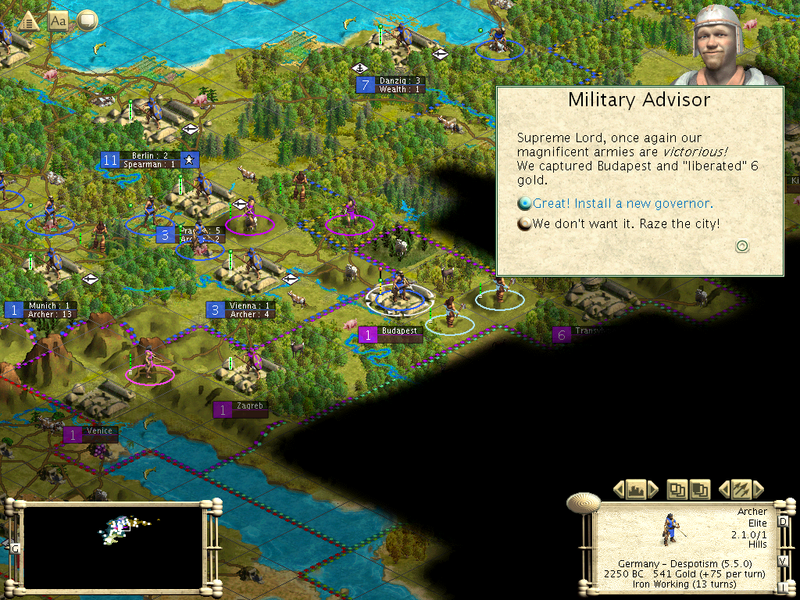
After a long, drawn out siege, Budapest fell in 2250 BC, splitting the former Austrian Empire in half.
In 2150, Zagreb fell. Only Venice remains before an accord can be reached with the former Austrian states...
Much like Budapest, Venice was besieged on and off for over a century. It was an incredibly well-defended city by Austrian terms, which explains why it had so strongly asserted it's independance. Not that we can blame them, they were next to Rome, which was probably desperate to absorb nearby areas.
In 1950 BC, the Berliners discovered how to make iron weapons. This was surely to turn the tide against the Austrian states. Shortly after, before we could even field our first swordsmen, our archers finally crushed Venice and burned it's fortifications to the ground. The city was captured, it's harbor prepared for our uses. The large navy inside it was destroyed, and the wines outside the city could now reach every inch of the German realms, and affluence gradually accumulated.
Much like Budapest, many slaves were found in the city and were set free because of their German lineage.
And now, we close this section with this:
THE FIRST REICH - THE GREAT DESPOTATE
Despot Wilhelm I was putting on his finest garb. It was time to announce the good news to the people, the war was over, Austria crushed, and the Berlin - German alliance supreme in Central Europe.
He strode out the doors, standing on the large balcony that overlooked the town.
Shouting at the top of his voice, the Despot began.
"MY PEOPLE! Today is a glorious day for all Germans, Berliner, Austrian, Dutch, Rigan, or otherwise! We have finally crushed the seperatist movement in Venice, and we have signed a peace treaty with what little is left of the Austrian royal family and nobility in Transylvania!"
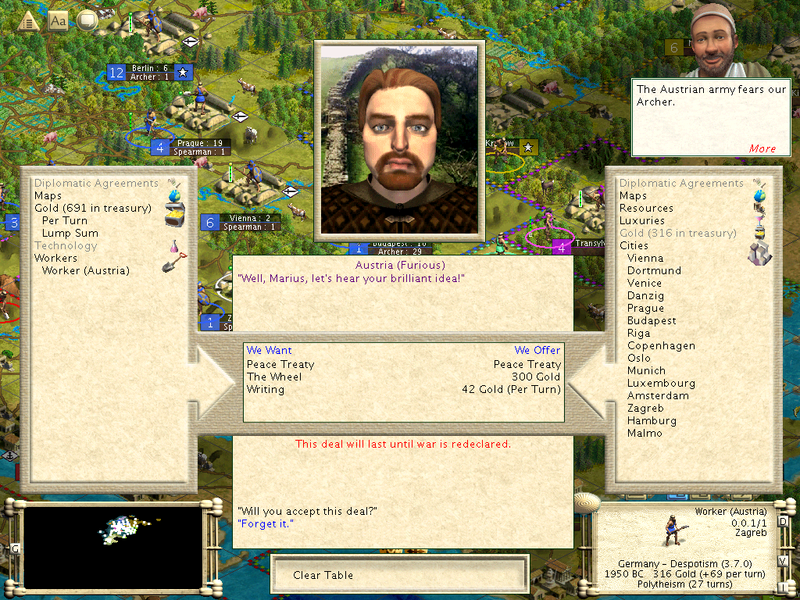
One of the Despot's aids held out the document, which the Despot took with glee. "Ahem! As per the terms of this treaty, the Despotate of Berlin has been granted knowledge of the Wheel and a writing system, in exchange for peace, most of our current treasury stores, and 420,000,000 marks per term."
The crowd instantly started to boo, realising it sounded like THEY had lost, not Austria or it's successor states.
"But wait, my loyal citizens! There is more!" The crowd went silent. "We are able to keep all of the lands captured during the war! We can use these lands as we wish, we can improve them and use them to downscale the increased spending as well! The slaves we have captured are ours to sell! The port of Venice is now ours to use for naval expansion in the great Mediterranean and beyond! We can now focus fully on improving our economy, our military, and making sure we can compete with our rivals on a technological scale!"
The people started to cheer, but once again the Despot's courtesans motioned for them to be silent.
"FURTHERMORE! From this day forward, the Despotate of Berlin is dissolved!"
The crowd was puzzled, whispers of confusion abound.
"But fear not! All other German states are dissolving as we speak, and within a month we shall convene a constitution for a new GRAND DESPOTY OF GERMANY! No longer shall we be divided as our enemies develop powerful states! From this day forward, we are the First and Foremost GERMAN REICH, with me as your first GREAT DESPOT! Your uber-fuhrer!"
The crowd cheered, and what was to happen to the new Grand Despoty? Only time would tell.
---
And so this chapter ends with Germany straddling Europe like a giant, but it is hardly through it's time of troubles. The long, drawn out war with Austria caused it's economic and technological growth to stagnate, and now it faces obsoletion when compared to states like the as of yet unknown Chinese, Indians, Arabs and Greeks. Will Germany be able to overcome it's limits and become the economic, military, and political superpower? Or will it be rolled over by tanks as it continues to struggle in the middle ages?
So, here is the story of the German Reich!
---
Qualities : This is made on a slightly modified version of Teturkhan's Test of Time. Some cities have been added, many cities have changed owners, the Celts have become the Balkans/South Slavs while the Hungarians have been turned into the Austrian Empire.
More roads have been added based on major trade routes, and the slave trade is emulated by the fact that most pre-Industrial units can enslave and create a worker, which in turn can be sold abroad for money.
Asian Pirate Ships and Pirate Ships can be build by the major powers, provided they have the blue Buddha Relics and Coptic Cross respectively. Germany, France, Spain and Britain, thanks to their real naval races, also have the ability to acquire Asian Pirate ships - they just have to convince China to give up a Buddha Relic. ;3
---
The First and Last Reich - 4000 - 3000 BC
As a child, I remember how the German empire straddled the globe. I was too young of course to really care for the most part, but it was still interesting. Becoming a historian, I dug very deep into our legacy. I went as far back as 4000 BC, far before the German state existed.
Those were days of grave uncertainty. You were lucky to see your grandchildren be born, or see your children reach maturity. You never knew when Barbarian hordes would come in and sack your city, steal your women and massacre most of those you knew and cared for. But most of all, it was an age of strong localism, there were no truely great empires.
In Germany's case, we started off as a medium-sized people. Over the generations, we had spread out across our home continent of Europe, stretching from Amsterdam in the West to Riga in the East, far along the Baltic coast. We were far flung, but rivers, forests, and mileage greatly crippled our potential to be an empire. We had little infrastructure, and the determined attacker would devour our people with little difficulty.
Within a few hundred years, some towns and villages gained an edge over others. In the western part of the empire, near the Rhine, Amsterdam became the most powerful village, trumping Dortmund and building the fortress of Luxembourg. In Central Germany, Berlin founded many colonies, such as Hamburg. And far to the east, Riga and Danzig each consolidated their rule over the nearby lands, forming 4 core regions of the German people.

Within years, we also had met other major groupings of people. To the north were the Vikings, who modern biologists trace our origin to. To the east were the Russians, a vast horde of people with considerable power on the Eurasian landmass. Finally, to the south were the Austrians, who also had considerable power. The German people were rather small in terms of landmass compared to these other giants, but enough pressure would bring Germany the prosperity and unity it desired.
This leadership came from the city of Berlin, in the center of the German peoples. Fielding a vast military machine that kept central Germany tightly under it's rule, Berlin established relations with the Vikings and acquired details of their landmass via maps, at the cost of depleting much of it's treasury. Berlin also met the Austrians at the city of Prague, and even tried to send diplomats to Riga, Danzig and the cities of Russia.
All across the world, the dominant political system was one of tight social and political controls, regulated not by a Constitution or religion, but by military might. The main way of increasing stability and hurrying projects was by forcing criminals and peasants to work on them to the moment they died. A cult of personality was built around the center of the military's power, known as the Despot. Despotism reigned supreme across all continents and cultures. Germany was no exception.
Berlin paved it's way to leadership - literally. Large groups of workers were sent to build routes through the forests and towards Danzig and Riga, and the small landlocked nation south of it - Poland. By connecting all major cities, Berlin hoped to facilitate trade and a sense of nationalism, or at least make it easier for their armies to crush their opponents and declare themselves rulers of Germany.
In a few more years, we noticed the movements of foreigners who came to be known as the French and British. We saw the British send a large expedition of settlers on a voyage out of their island home...only to see the fleet devestated by a large fleet of Pirates. A sad day for Britain - a GREAT day for the Berliners.
We acquired maps of Britain and France, Germany's world slowly taking shape. However, it did not excuse the fact that Germany remained rather behind in technology. We were too busy fighting amongst ourselves, while Britain and France had mastered the arts of pottery, masonry, the alphabet, among other things.
After some completion of the road, the Berliners became all the more aggressive. They saw Scandinavia as an imperialistic power that would conquer Germany if given permission. As such, they planned to annex Copenhagen and kick them off mainland Europe. This would be facilitated by building a road east of the Elbe river near Berlin, half of our public works being devoted to this military road, the other half continuing to build paths towards Danzig - which was already connected to Riga, thanks to a convenient trade route known as the Amber Road.
Germano - Viking War
The war against Scandinavia began in 3450 BC. It was a quick battle, and Copenhagen was taken by our archers with minimal casualties. The objective was accomplished, and the Berlin government would wait out the war until it could acquire favorable terms. Several Scandinavians were also acquired as slaves, these were sent back to Berlin and sold.
The 3400's BC was a time of prosperity for Berlin and all Germany. The Berliners now controlled Copenhagen and had sealed off their northern front, they had also finished their road to Danzig, and they met the Poles of the East for the first time. Only 600 years into existence, Germany had become more centralised, all that was left was for Berlin to 'convince' the rest of the German states to become 'allies'.
The Berliners did this by advancing themselves far beyond other countries. In exchange for giving up it's Warrior Code of honor and knowledge of the arts of war, Britain yielded the arts of pottery, ceremonial burial, and how to create an alphabet. Berlin also heavily bankrupted itself with 2/3 of it's annual GNP being given to Britain for these technologies, and all money on hand was handed over as well. But to the Berliners, conquest of the Scandinavians and the rest of Germany would outweight the costs of doing it.
Berlin - Vienna Competition
Berlin's aggression continued in 3250 BC, with the invasion of the city of Prague on the outskirts of Austria. Berlin felt that all the regions of Germany should be united under it's hegemony, which the city of Vienna contested, as it dominated Austria. Thus, war broke out, with most of Germany coming to aid Berlin.
Treaty of Oslo - Ends the Scandinavian - Berliner War

3200 BC saw further expansion of Berlin's empire. The Scandinavians, tired and war weary, chose to sign a peace treaty and surrender. The treaty of Oslo destroyed Scandinavia in practice. What little was left of their economy was sent to Berlin, and their cities of Malmo and Oslo ceded to the Berlin Despotate. Berlin was on the rise, now controlling much of the Baltic and North Seas.
The fall of Prague was a considerable victory, but two cities were wanted by the Berliners - Vienna and Munich, both strongly German in ethnicity, but refusing to admit Berlin's dominance.

It took several centuries, but constant skirmishes between Berlin and Vienna caused the fall of Munich into Berliner hands. The other German states had all had times of troubles, crippling their economies as they tried to keep up with Berlin in power, but to no avail. The Despot of Berlin, Heinrich von Elbe, once a mere peasant, stated that the war would never reach a true, infinite end until Vienna had been captured. But in reality, Heinrich was focusing on a potential asset that Austria held - Venice. With it's naval capabilities, Venice would be an excellent base with which to further expansion in the south, across whole seas and oceans.
Relations were opened with Isabella of Castile in the year 2600 BC. Isabella was a strong woman, and with her husband Ferdinand of Aragon, they controlled the Iberian peninsula, albeit with an incredible rivalry and disadvantage towards the Carthaginian maritime empire. Isabella sold the Berliners a map at a great price, revealing huge chunks of land to the south, on a continent called 'Africa'.

Finally, in the year 2500 BC, the Berliners managed to destroy the Vienna garrison once and for all. The best archers were in such larger numbers not even Vienna's formiddable defenses could keep them back for long. Many slaves were captured with the city, 2/3 of whom were actually German soldiers or their descendants captured during the onslaughts of the past hundreds of years.
---
Emperor Franz Ferdinand fled from his capital of Vienna with amazing speed on his horses, as did his best men and family. They were fleeing East, towards the city of Budapest, which would be the military capital, while the Emperor himself would camp out in Transylvania, which had a large population yet was relatively remote.
"Those barbarians...they are so backwards! How in the world did they capture 2 more cities from us?! Prague fell because we weren't expecting such an attack...but now Munich and VIENNA?!" the emperor was concerned. The massive 'protection racket' that Vienna and Austria had held on Central Europe was collapsing in the face of a few thousand troops from Berlin and it's allies. In fact, every spec of German ethnicity besides the emperor and his loyalists was now within Berliner hands.
"It seems a lack of formal training outside Vienna weakened us sir. Every German city is under some sort of full protection from Berlin, which is supplemented through a military base in every city. That also serves to keep the city loyal. Because of this...their soldiers have been vastly superior..." one of the Emperor's military advisors replied.
"Damn. Either way, we must reach Budapest by the end of the week. The Hungarians are expecting us, they're willing to work out some sort of deal to let us rule them directly. Apparently their current overlord is so corrupt and vicious that they'd rather let a foreigner take over."
The emperor was never to take his new throne. Not too far from the city, he and his caravan were ambushed by Budapest patriots. They opened fire with a hail of arrows, and within an hour most of the emperor's group was dead. Franz himself was assassinated by an arrow straight through the eye. The Austrian monarchy was gone, as most of his family was massacred as well or captured in Vienna. The empire would soon dissolve as Zagreb, Transylvania, Venice and Budapest heard the news.
Austrian Empire breaks down
Constant warfare was waged for the last few sections of the Austrian tributary empire. The many cities that had been under it's suzerainty fragmented, some asserting independance, others laying claim to the Crown of Vienna. Regardless, the Berlin - German coalition sought to annex these regions to provide 'security'. In reality, it was securing the route to Venice, the real prize in the war. Budapest was targeted because it was on the same side of the river as Vienna, thus not hindering movement. Once that was taken, it was planned to march on to Zagreb, then finally Venice. Transylvania, rural and not having much value, would be left alone.
---
The alarm bells all over Budapest rang at about 4 AM one cold morning in 2250 BC. Citizens rushed to the streets, eager to see what was occuring, being told to go see their new leader, "Emperor" Leopold III, who was Hungarian but had Germanised his name to add credibility to him being the successor of Franz Ferdinand.
"Citizens of Budapest, soldiers of Hungary, subjects of the Austrian Empire! Before us, only mere miles way, lie the armies of Berlin and it's usurper allies!"
The citizens suddenly talked amongst themselves, panic, worry and fear clearly mixed in with their comments.
"Be silent, my people! For you need not fear. We have adequate supplies, adequate weaponry, and good soldiers to protect us. You shall be armed yourselves. If we are to turn back the siege and eventually press on to reclaim the throne at Vienna, we must defeat these barbaric hordes, not just with our army, but with our spirit and our entire population! The outcome of this battle is a crushing victory...or utter ruin.." Leopold said. "Arm yourselves, and prepare for the fight for Austria! For our freedom and dignity!"
And armed the people were within the hour. The German Coalition's army neared the gates, merely a few hundred feet away, the light from the city in clear view.
The commander, Rene Robespierre - a French explorer turned defector turned soldier - told his men to stand ready, the charge was coming. He knew the land well from his work in the French foreign services, so he knew how to order his troops.
"Germans! His majesty Freidrich II has given us clear orders! We are to attack this city and do whatever possible to capture it! Once this is done, the mop up and conquest of Austria's former empire will be that much easier. His highness' predecessors siezed Vienna and it's throne, we must sieze what is rightfully our lords', and ours as well!"
The troops let out a cheer, so loud it was heard somewhat in Budapest. It was going to be a difficult battle, many believed. And they didn't know the half of it...
Only half an hour later, the German army assaulted Budapest, tearing down it's wooden fortifications with ease. But it was to be a slaughter that would last months. The siege of Budapest chewed up tons of men, both German and Hungarian. Constant re-inforcements had to be brought in from the homelands to swallow up the troops that seemed to rise from the dead of Hungary's ranks. It took a long time and many casualties - some of which were the best in the German Army - but Budapest fell eventually. A pity, it had sent out two raiding parties of archers, which were found at the outskirts of Berlin and dealt with. Either way, the greatest city of the former Austrian crown was now in Berliner hands. And now, it was time to devour the western sections of the empire...
But of course, failure has it's price. Robespierre was executed shortly after for his incompetence. The French used it as an excuse to criticise the Germans, but in reality, they themselves would have likely executed Robespierre for his defection.
---

After a long, drawn out siege, Budapest fell in 2250 BC, splitting the former Austrian Empire in half.
In 2150, Zagreb fell. Only Venice remains before an accord can be reached with the former Austrian states...
Much like Budapest, Venice was besieged on and off for over a century. It was an incredibly well-defended city by Austrian terms, which explains why it had so strongly asserted it's independance. Not that we can blame them, they were next to Rome, which was probably desperate to absorb nearby areas.
In 1950 BC, the Berliners discovered how to make iron weapons. This was surely to turn the tide against the Austrian states. Shortly after, before we could even field our first swordsmen, our archers finally crushed Venice and burned it's fortifications to the ground. The city was captured, it's harbor prepared for our uses. The large navy inside it was destroyed, and the wines outside the city could now reach every inch of the German realms, and affluence gradually accumulated.
Much like Budapest, many slaves were found in the city and were set free because of their German lineage.
And now, we close this section with this:
THE FIRST REICH - THE GREAT DESPOTATE
Despot Wilhelm I was putting on his finest garb. It was time to announce the good news to the people, the war was over, Austria crushed, and the Berlin - German alliance supreme in Central Europe.
He strode out the doors, standing on the large balcony that overlooked the town.
Shouting at the top of his voice, the Despot began.
"MY PEOPLE! Today is a glorious day for all Germans, Berliner, Austrian, Dutch, Rigan, or otherwise! We have finally crushed the seperatist movement in Venice, and we have signed a peace treaty with what little is left of the Austrian royal family and nobility in Transylvania!"

One of the Despot's aids held out the document, which the Despot took with glee. "Ahem! As per the terms of this treaty, the Despotate of Berlin has been granted knowledge of the Wheel and a writing system, in exchange for peace, most of our current treasury stores, and 420,000,000 marks per term."
The crowd instantly started to boo, realising it sounded like THEY had lost, not Austria or it's successor states.
"But wait, my loyal citizens! There is more!" The crowd went silent. "We are able to keep all of the lands captured during the war! We can use these lands as we wish, we can improve them and use them to downscale the increased spending as well! The slaves we have captured are ours to sell! The port of Venice is now ours to use for naval expansion in the great Mediterranean and beyond! We can now focus fully on improving our economy, our military, and making sure we can compete with our rivals on a technological scale!"
The people started to cheer, but once again the Despot's courtesans motioned for them to be silent.
"FURTHERMORE! From this day forward, the Despotate of Berlin is dissolved!"
The crowd was puzzled, whispers of confusion abound.
"But fear not! All other German states are dissolving as we speak, and within a month we shall convene a constitution for a new GRAND DESPOTY OF GERMANY! No longer shall we be divided as our enemies develop powerful states! From this day forward, we are the First and Foremost GERMAN REICH, with me as your first GREAT DESPOT! Your uber-fuhrer!"
The crowd cheered, and what was to happen to the new Grand Despoty? Only time would tell.
---
And so this chapter ends with Germany straddling Europe like a giant, but it is hardly through it's time of troubles. The long, drawn out war with Austria caused it's economic and technological growth to stagnate, and now it faces obsoletion when compared to states like the as of yet unknown Chinese, Indians, Arabs and Greeks. Will Germany be able to overcome it's limits and become the economic, military, and political superpower? Or will it be rolled over by tanks as it continues to struggle in the middle ages?

